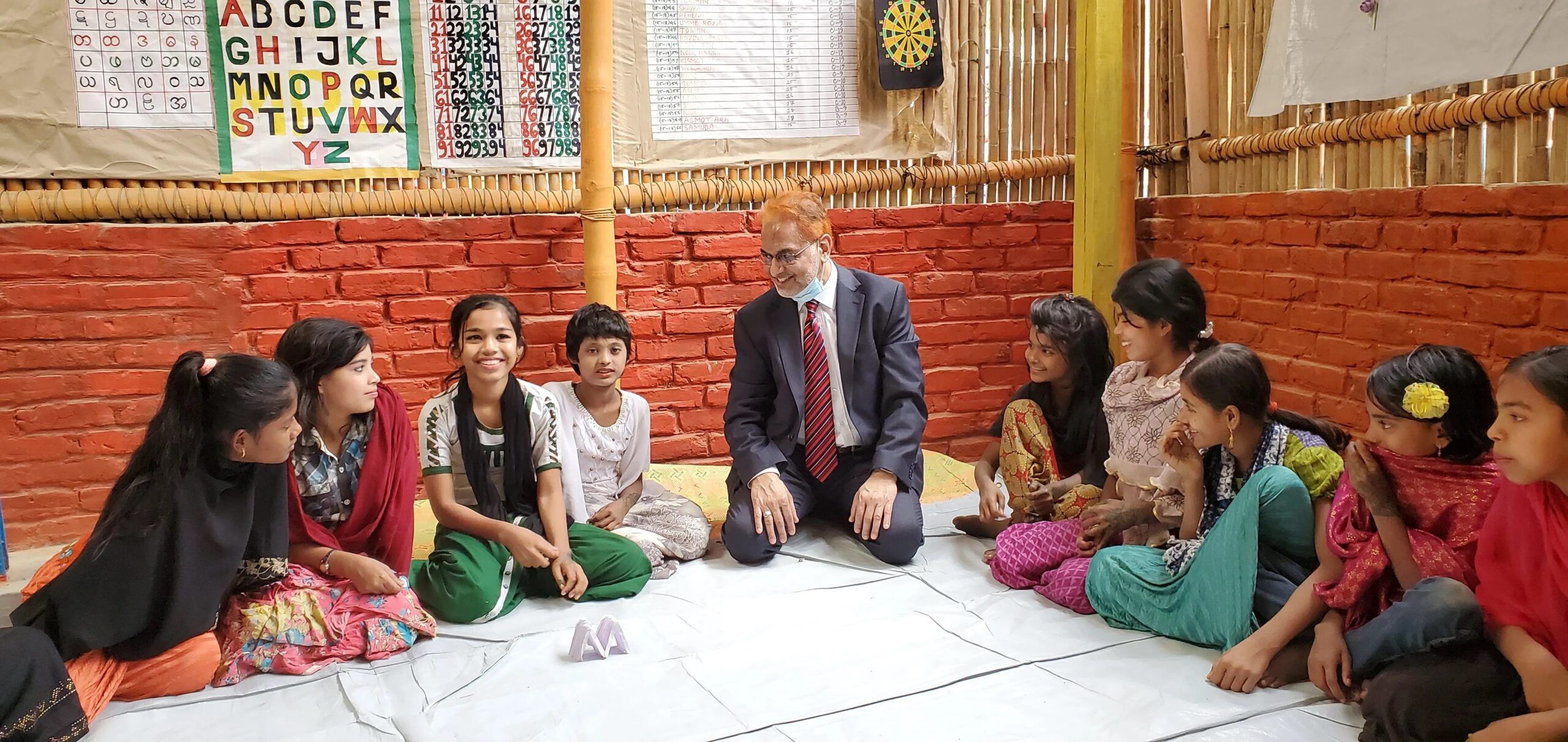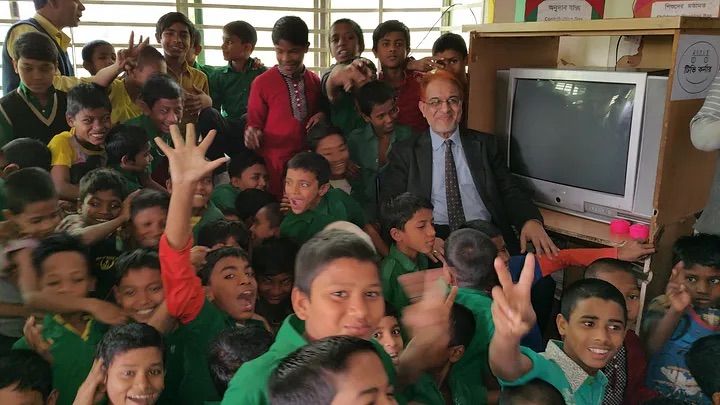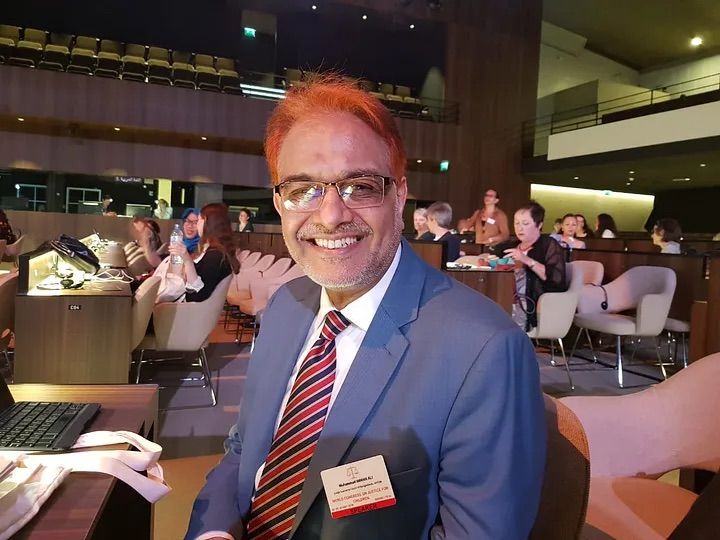The Bangladeshi Judge Who Protected People in the Justice System From COVID-19
In March 2020, Bangladesh responded to the spread of the coronavirus by going into lockdown. This helped limit the spread of the virus, but by blocking or delaying the delivery of justice, it also threatened to expose those who were incarcerated to a disease that thrives in overcrowded conditions.
Many other countries have faced similar problems after going into lockdown, with backlogs of court cases clogging up justice systems and prisons proving to be petri dishes for COVID-19 outbreaks. But by implementing a system involving virtual courts and electronic bail applications, Bangladesh, whose prisons are among the world’s most crowded, has bucked the trend. Since the lockdown began it has released more than 60,000 adults from pre-trial detention and 700 children from custody. In one ten-day period, the justice system heard 33,000 bail applications and released 21,000 people on bail.
In the latest of our Justice Champions of Change interviews to focus on justice during the pandemic, Maaike de Langen talked to Justice Imman Ali, a judge in the Supreme Court of Bangladesh who was instrumental in establishing the new system, to find out how it was done.

Maaike: You are a judge in the Supreme Court, and you have many additional roles. You chair the Supreme Court special committee on judicial reforms, the special committee on child rights, and the committee that deals with overcrowding in prisons. To start with that last issue, how bad is the problem of overcrowded prisons in Bangladesh?
Justice Imman Ali: It’s very bad. The capacity of our prisons is about 40,000. And before the pandemic, the occupancy was around 91,000 — more than double the number we have capacity for. We were at the stage where people were sleeping on their side because there was not enough room to turn onto their backs. In children’s detention centres, the capacity was for 600 children and the occupancy 1,140 — almost double.
Maaike: And how do you go about tackling overcrowding?
Justice Imman Ali: In 2008 I was invited to talk about this problem at a dinner hosted by an international organisation. I told them that reducing prison overcrowding was very simple. If you open the back door and let everybody out and close the front door so nobody else comes in, you have an empty prison!
They laughed and then asked me to explain myself. At the time, around 66% of those in prison in Bangladesh were under-trial — meaning they hadn’t yet been convicted of anything. Today it’s probably a little more than 66%. And I said that under-trial prisoners need not be in prison unless they’re a threat to society. Under-trial prisoners are innocent until they’re proven guilty — that is in our Constitution. Why keep them there unless you have to?
So how do you let them out? First of all, by determining whether a person is a threat to society. And if we can ensure they will not threaten witnesses/interfere with the investigation and will appear at the next hearing, by granting them bail, then we can release them. Somebody granted bail is not free. He cannot just go anywhere he wants. There can be conditions placed upon his movement. But at least let him out of prison. That’s the legal way to do it — not just opening the back door, but opening it for those who are entitled to be out.
Maaike: And what about closing the front door?
Justice Imman Ali: You can’t completely close the front door, but you can certainly leave it ajar. You teach the judges whom to send to prison and whom not to send. Judges deal with criminals day in and day out and they may have a negative attitude towards people who are accused. They need to be told every so often, “Look, we know you’re dealing with a bad lot of people, but they’re innocent until you find them guilty. Keep reminding yourself of that.” They also need to be reminded that only 7% of those tried are ultimately convicted. Changing these attitudes can lead to a more streamlined sentencing policy. Not everyone needs to be sent to jail for ten years — they can be sent to do community service or on probation instead. That was my speech.
Maaike: Can you tell me about how you’ve applied these ideas to be able to release so many prisoners during the coronavirus pandemic?
Justice Imman Ali: In a way the coronavirus helped to advance this agenda. I was scared that if COVID-19 got into the overcrowded prisons and custodial centres it would be a disaster, so I wanted to do something. But when Bangladesh went into lockdown in March the government declared a holiday, which meant there was no parliament and no court sessions. Unlike some countries, we didn’t have a law in place to conduct virtual hearings. And with parliament on holiday we couldn’t issue any new laws and the courts being shut, no orders for remote hearings could be issued.
Together with the Chief Justice and other judges of the Appellate Division, we decided to press the powers-that-be to release prisoners, but some of us didn’t think letting prisoners out would be popular. Then we suggested passing an ordinance under the powers of the President allowing urgent bail applications to be made by video conference. This was approved in a meeting of the Full Court, meaning all the judges of the High Court Division and the Appellate Division of the Supreme Court of Bangladesh. There was some resistance to this because parliament was closed. The Chief Justice and Law Minister had meetings with higher authorities. Fortunately, the president of our country is a lawyer, and when he heard about the idea he agreed to sign an ordinance saying that virtual presence on a monitor at a hearing is equal to physical presence. Then things became easier.
Maaike: How did you go about implementing the ordinance?
Justice Imman Ali: As far as the children were concerned, a few years ago I had video conferencing facilities installed in the three custodial centres we have in Bangladesh, which I paid for with my own money because nobody else was coming forward to pay. The reason I got this equipment into place was because the children are far away from home and they are in a vulnerable situation, and their parents could not visit them. We decided to have the video cameras and monitors set up so that parents could go to an office in their local area where they could have facilities for video conferencing, and they met their children there, virtually. The situation was so emotional. They were crying with joy because after so many months they could actually see each other.
In the meantime, I had also installed some model children’s courts, with the help of UNICEF. I had video camera facilities installed in the courtrooms, so that instead of coming to court, children could appear through videoconferencing. At the request of the Child Rights Committee, the Chief Justice issued a Practice Direction to the effect that the presence of children alleged to have committed an offence should be dispensed with if their virtual presence could be ensured through videoconferencing. That would suffice for the law, as well as obviating the need for transport security, etc. I thought we could use this system during the pandemic. And with the help of the UN Development Programme and the Supreme Court IT department, we rolled out the technology so that it could be used by adult prisoners as well as children.
Of course, all credit goes to the judges who implemented the law in spite of the lack of proper and adequate resources and the teams from UNDP, a2i, and the Supreme Court who worked tirelessly to provide the technical support.
Maaike: How easy was it to encourage people in the justice system to embrace the new technology?
Justice Imman Ali: We had to allow some flexibility, because not everybody could appear through the videoconferencing facility that we provided. They didn’t all have smartphones or laptops — particularly the police personnel who held the files relating to the cases. So I had meetings with the judges every day, often twice a day, via Zoom. And we agreed that they should be flexible, that if somebody wants to appear by Zoom they should be sent a link for a Zoom meeting, but if somebody says they can’t operate Zoom they could use WhatsApp (as long as you can recognize the person on the other end, of course). And for the police who didn’t have any of these facilities, let them come into your chamber and stand some distance away and show you the case papers so you can read it. That’s how it happened.

Maaike: Were there any challenges you had to overcome?
Justice Imman Ali: The first bails were granted on 11 May, two days after the ordinance was passed. But that evening we received a report saying that nothing had happened in the Children’s Court. I asked why not, and the judges who were presiding over the Children’s Courts told me that no lawyers had come with an application.
Nowhere in the Criminal Procedure Code does it say that an application has to be made and nowhere does it say that the lawyer has to be present. You don’t need a written application; you don’t need a lawyer. All you need is a person to say: “I want to go home.”
And when you’re dealing with children, if the child says, “I want to go back to my mommy,” that’s enough. That’s an application for bail. The judges and lawyers call it bail, the child says, “I want to go home.”
I told the judges there’s no need for lawyers, because the child is going to be appearing in front of you, from the custodial centre on a monitor. And there is no question of wrong identity because the superintendent of the centre is going to say: “This is that child, this is for that case.”
Maaike: So instead of expecting a lawyer to file an application in court, the judges needed to adopt a different perspective. How did this change happen? Did you speak to them individually?
Justice Imman Ali: No, there are 102 Children’s Courts so I got them all on Zoom. Around 90 took part in the meeting, and they understood very quickly. They came on board and the next day they began granting bail to the children. Many of the offences they’re alleged to have committed are very minor. Of course, if a child steals something it’s an offense under the Penal Code and he has to be prosecuted. But does he have to be held in custody before he’s found guilty? Can you give him back the months and years that you’ve kept him in detention or custody while you’ve been trying the case? And if you find him guilty, do you have to give him the three-year maximum sentence for stealing? Even non-custodial measures are available as sanction.
Maaike: How successful has it been?
Justice Imman Ali: As far as children are concerned, up to 23 July, 755 children were granted bail. And for adults, the latest figure is that from 11 May until 23 July the lower courts dealt with 136,399 bail applications. They allowed bail to 67,229 persons.
Maaike: That’s more than two-thirds of the prison population?
Justice Imman Ali: Yes. It doesn’t mean two-thirds of the prison has become emptied because there have been others coming in. The prison population at the moment is around 60,000, down from over 90,000. So they’re still 50% overcrowded, but it’s much better than it was.

Maaike: Finally, it sounds like even though the court is officially on holiday, you have worked really hard during the period of the pandemic. Where do you draw your inspiration?
Justice Imman Ali: The pin I am wearing is the founding father of Bangladesh, Bangabandhu Sheikh Mujibur Rahman. This year is the centenary of his birth, so the country is celebrating. We are always inspired by our heroes.
Maaike: What made him special?
Justice Imman Ali: It was his dynamic leadership that got the country where we are today. He fought for the people, and served in jail for the people. And he wanted justice for the people. He was always saying that the courts and lawyers weren’t helping his people to get justice. He was all for taking away technicalities and giving justice.
Recently his daughter, who is now the Prime Minister, published his memoirs and some of his diaries, and one phrase that I really like in that book is something that apparently Bangabandhu’s father told him and that is that, “If you have sincerity of purpose and honesty of purpose, you will never be defeated in life.”
I use that as a model to motivate myself, because what I do, I do thinking that it is for the better. I don’t get any extra benefit out of what I’m doing, but I still want to do it because it’s helping someone to get justice who is not able to help himself. What is the rule of law? It’s about ensuring that justice is done for the people. In a case somebody wins and somebody loses. But if you can tell them why they have won and why they lost, that’s what they need to know.
Related Resources
